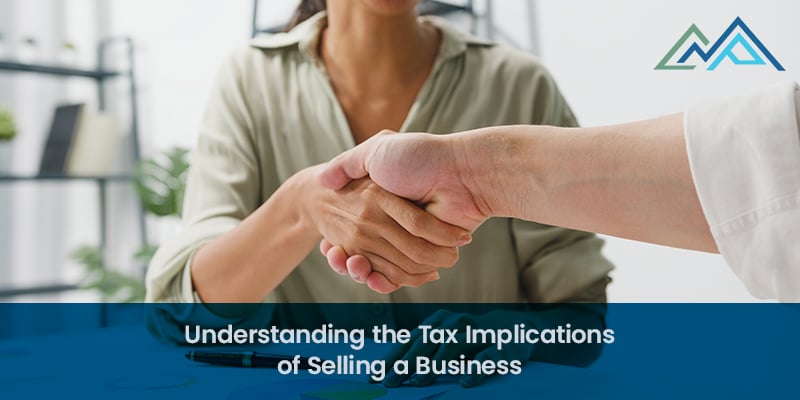Starting a business requires hard work and dedication. For many entrepreneurs and business owners, selling a business is the biggest reward because it means they’ve grown a company to the point where somebody else is willing to pay for it.
A common issue for CMP’s business clients who want to sell their companies is how to minimize capital gains taxes. Here's what you need to know.

Who Pays Sales Tax When Selling a Business
When you sell a business, you make money. While you might have spent a lot of money to get your business off the ground, you probably took tax deductions and credits to offset some of those costs.
When you sell a business, you’ll need to pay taxes on what you gain. In most cases, the proceeds are taxed at the capital gains tax rate, but some assets may be taxed as ordinary income.
If I Sell My Business, How Much Tax Will I Pay
There are several factors that may impact the amount of taxes you’ll pay when you sell your company. Some of these factors include the following:
- Your total income for the year in which the sale is completed.
- How long you have owned the business in question?
- How much profit you will make from the sale of your business.
- Any business liabilities that reduce your net proceeds.
People over a specified income threshold may also be required to pay a 3.8% Medicare surtax, and we’ll talk about how that can impact your taxes in the next section.
How Are Business Sales Taxed?
Business sales are taxed based on how much gain the owner recognizes from the sale. Typically, a small business owner will pay for a business valuation to determine the worth of the business and how much they can reasonably expect to receive for it.
A business valuation encompasses the valuation of intangible assets, such as the company's name, reputation, branding, and products, which may be included in the purchase price.
When it’s time to calculate the taxes for the sale of your business, you’ll need to calculate your net gains.
With a stock sale, shareholders may be required to pay capital gains tax on their gains. Corporations may be required to pay an additional corporate tax, as well.
Capital Gains Tax on Selling a Business
For most of U.S. history, capital gains have been taxed at a more advantageous rate than ordinary income. The Tax Cuts and Jobs Act of 2017 retained the favorable rates for capital gains tax with some changes that affect how the rates are applied. Here's how it breaks down.
- The capital gains tax rate for long-term gains is 0% for single individuals and couples who are married and filing separately with taxable income below $41,675, below $83,350 for married couples filing jointly, and below $55,800 for single heads of household.
Are you and your spouse at odds over how to file your taxes this year? Our blog post on Married Filing Jointly vs Separately is here to help. Gain a deeper understanding of the financial implications of each option and discover which one can potentially save you money.
- The capital gains tax rate for long-term gains is 15% for individuals with taxable income over $41,675 and less than or equal to $459,750; married couples filing jointly with income over $83,350 and less than or equal to $517,200; single heads of household with income over $55,800 and less than or equal to $488,500; and married couples filing separately with income over $41,675 and less than or equal to $258,600.
- The capital gains tax rate for long-term gains is 20% for individuals with taxable income above $459,750, married couples filing jointly above $517,200, single heads of household above $488,500, and married couples filing separately above $258,600
Individuals with more than $200,000 in adjusted gross income ($250,000 if married and filing jointly) are also required to pay the Net Investment Income Tax (NIIT) of 3.8%, which is a Medicare surtax.
If you’ve owned a business for less than a year before selling it, the proceeds will be taxed at the ordinary income tax rate.
How Is Goodwill Taxed When Selling a Business?
The goodwill you’ve built for your business is considered an intangible asset for purposes of taxation. Any payment for goodwill must be reported as a long-term capital gain.
Long-term capital gains rates for goodwill are the same as those for any other asset: 0%, 15%, or 20%, depending on your annual income.
Tax Considerations Before Selling a Business
There are some important tax considerations that you should keep in mind before selling a business. Here are eight to consider.
Terms of the Sale
The terms of your sale have the potential to impact your taxes, particularly when something other than cash is part of the deal. Here are some of the most common terms and how they’ll affect your taxes.
- Cash at closing. You receive cash at the closing of the sale, and you’ll need to pay capital gains taxes in the year when the transaction closes.
- Earn out. The buyer pays some of the sale price in cash at the time of the sale and agrees to pay the rest over a specified period. You’ll pay capital gains on the initial payment in the year the transaction takes place and report additional earnings in the year they’re paid.
- Equity rollover. The seller agrees to retain some stock in the company in exchange for a lower purchase price. You’ll pay capital gains tax on the stock you sell and hold onto the rest of your stock in the hope of realizing future gains.
- Seller’s note. In some cases, the seller may agree to allow the buyer to pay for the company over time, usually with a low-interest rate. This type of agreement reduces the amount of capital gains tax you’ll pay upfront.
Many sellers prefer cash at closing because it eliminates uncertainty about future payout. You’ll end up taking the biggest capital gains hit with that option unless you’re selling real estate as part of the deal and can take advantage of a like-kind exchange.
Sale Type: Stock Sale vs. Asset Sale
The sale of a business may be classified in one of two ways:
- A stock sale involves the sale of a majority share of stock to one or more buyers. This method can be used by S corporations and C corporations.
- An asset sale involves the sale of tangible assets, such as inventory, equipment, and property, as well as intangible assets, including goodwill and customer lists. An asset sale may be transacted together with a stock sale or as a separate transaction.
Type of Business Entities
The type of business entity you sell will impact how the taxes for the sale are calculated. Here's a quick breakdown.
- For a sole proprietorship, negotiate everything and keep track of what counts as ordinary income and what counts as a capital gain. Inventory sales are taxed as ordinary income.
- For a partnership, a business sale is a capital asset transaction and is subject to capital gains tax. However, the gain or loss from unrealized inventory or receivables may be treated as an ordinary gain/loss.
- Recapturing the depreciation on equipment is taxed as ordinary income.
- For corporations, sellers tend to prefer a stock sale because it generates capital gains tax, while buyers prefer to buy assets they can later depreciate. Keep in mind that the sale of a C corporation requires payment of the NIIT of 3.8%, while the sale of an S corporation doesn’t.
If you have a C corporation that meets the requirements to be classified as an S corporation, you can potentially use an S election to save money on taxes.
Purchase Price Allocation
When a business is sold, part of the process involves the purchase price allocation, which determines how much of the purchase price will be allocated to tangible and intangible assets.
This allocation has a big impact on taxes. As a rule, it is advantageous to allocate as much of the price to certain types of intangible assets as possible since these are taxed at the more favorable capital gains tax rate.
State Considerations
The taxation and laws regarding how tax is applied to business sales vary depending on where your business is located. State considerations can have a significant impact on how much tax you pay after the sale of your business.
As state laws can be just as complex as federal ones, we recommend hiring a certified tax professional to help you navigate them.
The Value of Business Assets
Deciding what value to assign to your business assets is known as business valuation. Some values, such as the cost of business equipment, real estate, and inventory, are relatively straightforward to calculate.
Valuation gets more complex when intangible assets come into the picture. When a business has a stellar reputation and a recognizable brand, it’ll be worth more than a similarly-sized business that lacks those assets.
Like-Kind Exchanges
Selling real estate that your company owns doesn’t need to result in a large capital gains tax bill. One way to defer your taxes is to engage in a tax-deferred exchange, which works only if you reinvest the proceeds of the sale in a like-kind property.
In a like-kind exchange, you won’t need to pay capital gains tax because you won’t realize the gains after buying another property. If you sell the property you bought, you’ll eventually need to pay taxes on your gains, but the 1031 exchange is a way to defer paying taxes until a later date.
Reducing the Taxes on Selling a Business
Having reviewed some ways to reduce your taxes when you sell a business, here's a recap to drive everything home:
- Be careful with purchase price allocation and do what you can to allocate proceeds to intangible assets to be taxed at the lower capital gains tax rate.
- Do a like-kind exchange to defer tax payments to a later date.
- Do an installment sale to spread out tax payments.
- Reclassify your C corporation as an S corporation by filing the appropriate tax election.
We also recommend working with a tax pro to identify potential tax deductions and credits.
How To Report the Proceeds from a Business Sale
The IRS requires you to report all proceeds from a business sale. There are three forms that you may be required to file.
- Form 8594 is the Asset Acquisition Statement, which both the buyer and seller must complete and return to the IRS.
- Form 4797 is the Sales of Business Property form that you’ll use to determine your capital gain or loss.
- File Schedule D with your personal tax return if you sell stock in a corporation.
You should also research your state's requirements for reporting the proceeds of a business sale to be sure you comply with them.
Hire a Tax Pro for Your Business Sale
Selling a business has significant tax implications that can be difficult to understand and navigate. While the information we’ve included here is a good starting point, we recommend working with an experienced tax pro to minimize your taxes on the sale of your business. The sale of a business will typically generate additional income, and you'll need to understand how that income is taxed.
Are you preparing to sell a business? CMP can help! Contact us today to schedule a consultation.


















